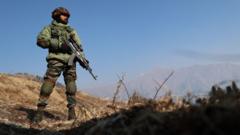General Munir's recent public remarks reflect a shift in Pakistan’s military leadership, as he takes a more aggressive stance toward India amidst escalating geopolitical tensions. His position is informed by both political imperatives and his hardliner views shaped by years in military intelligence.
General Munir's Assertive Stance Amid Rising Tensions with India

General Munir's Assertive Stance Amid Rising Tensions with India
Pakistan's Army Chief, Gen. Syed Asim Munir, emerges from a low-profile role to take a firm stand against India following a recent attack in Kashmir.
In a marked shift from his usual low-profile demeanor, Gen. Syed Asim Munir, the head of Pakistan's army, has recently taken center stage in addressing the soaring tensions between Pakistan and India, particularly following a fatal terrorist attack in Kashmir. Traditionally accustomed to operating behind the scenes, Munir has opted for a more assertive public stance, issuing stern warnings and rallying national sentiment amid intensified calls for military responses in India.
This shift began after the lethal assault near Pahalgam, which resulted in the deaths of over two dozen Hindu tourists, prompting demands for decisive action from the Indian government. As the situation developed, General Munir addressed troops during a military exercise, conveying a clear message: he stated, “Let there be no ambiguity,” emphasizing that any Indian military action would be met with a “swift, resolute and notch-up response.” Such comments underscore Pakistan's commitment to matching Indian military strength in the face of aggression.
Analysts interpret Munir's statements as an attempt to bolster support for the military in a country grappling with economic challenges and political fragmentation. Traditionally, Pakistan's military has enjoyed a strong bond with the populace, but years of economic turmoil have tested this relationship. Hence, Munir's assertive rhetoric can also be seen as a strategy to revive confidence in the military establishment.
However, Munir’s escalating remarks are not purely a response to domestic pressures. Observers note that his background as a leader in key military intelligence bodies—imparting him with a hardline perspective on India—significantly influences his approach toward the ongoing conflict. Munir views the longstanding tensions between the two countries as rooted in deeper ideological and religious divides, which shapes his response strategy.
With these developments, General Munir’s rise in prominence signals a potentially pivotal moment in Pakistan’s military-politics dynamics, especially as the region braces for the possibility of escalated military confrontations.





















